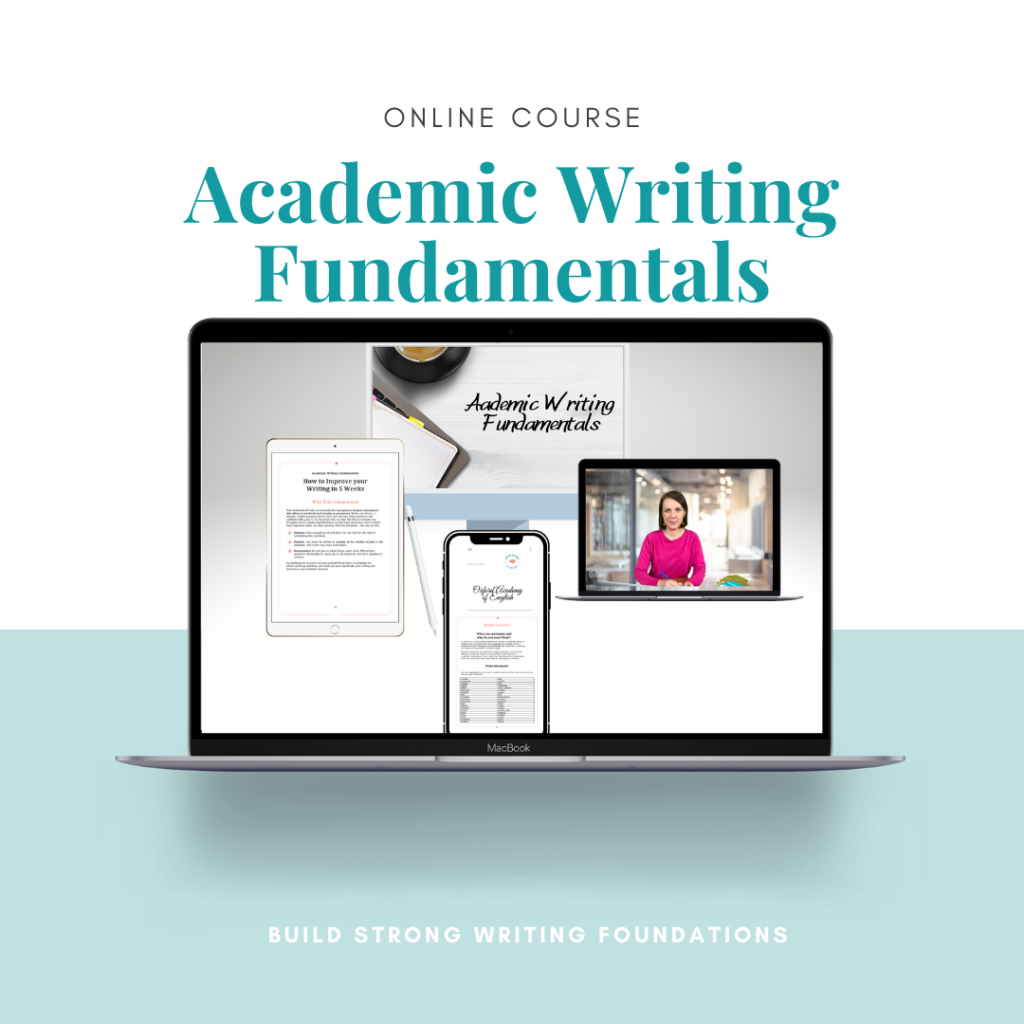
Welcome to the Academic Reading and Writing Made Easy Podcast 🙂
Join my FREE Facebook Group for additional support. Here you can ask questions about grammar rules addressed in the episode, and other questions about academic reading and writing.
Download the 3-step framework to my online course – – – click here

Shownotes
If you want to know how to take the first step and start seeing results on your degree course, you need to realise one thing. You can never perform well in radiology, computer science, business management or any other subject without strong writing skills. Having taught thousands of international students, I can say that many of them do not see a link between doing well in writing and other subjects. Many times, they see a writing classes as an additional language course, which they have to pass to progress to the next term, simply because they are international students. What a mistake! Believe me. Not only international students but also home students enrol on academic writing courses because writing for academic purposes is rigorous and requires a certain set of skills, which are not taught at school. There is nothing more contradictory to think that academic writing courses are for international students only. The reason why I address my courses for international students is that I was once an international student as well and I can totally relate to all your pains and struggles. Now, I am an academic lecturer, who motivates and helps students from China, India, South America, Korea, Japan, Europe to write well in English. With my experience, I can prove that once you have focused on the right thing, you can see results in any subject.
In my academic career I have done a lot of writing in many different subjects. As you can guess, I have written research papers related to the methodology of teaching English, but most recently, I have been writing a lot for my PhD thesis. And what I can say for sure is that once you know how to write academic papers, you can write well in any area of your interest. Why? How is it possible? Let me explain it to you 😊 with pleasure!
So, as you know English is not my first language. Just like many of you, I’ve had to learn it at school. I guess I don’t have to add that it was my favourite school subject. Having said that I had never done any academic writing nor at secondary school nor at university in Poland. Can you even imagine this? The only academic writing I know comes from here the UK and this is where I’ve learnt how do it and now, I am sharing this knowledge with you.
First things first, let’s answer the most important question. What is academic writing? There is no one definition of academic writing but for us lecturers of English for Academic Purposes, academic writing is a formal way of writing up research results. In order to do so, you need to learn the conventions of academic essays or reports. The good news is that there is not that much difference between essays or reports. They differ in the use of headings or subheadings and the amount of information you have got to present, but writing is still the same, meaning formal and research based. I talked about formality and objectivity last time, but once you’ve improved your academic vocabulary and English grammar, you can already see a lot of improvement. The other thing I like about academic writing is that it is structured. What I often say to my students is that I would never enrol on a creative writing course nor teach it. But what I love doing is teaching academic writing. As I said, academic writing is structured. You need to know how to structure your sentences, then paragraphs and finally the whole essay so that it meets academic requirements. And this is exactly what I teach in my online course Academic Writing Fundamentals. I give you a step-by-step formula for writing academic essays so that you never again sit in front of your laptop, wondering where to start, or how to start writing. Once you have built strong writing foundations (meaning grammar and vocabulary resources), you can move onto refining your academic skills. Remember that what I teach you gives you high scores. I do not talk about just passing a module – getting 40 or 50%. My aim for you is to be able to reach high marks that give you a merit or even distinctions. But again, there is a method for this as well. And I do believe that once you follow t the right steps, you can not only see a difference in your marks, but start enjoying writing essays, reports or other assignments for university. It is all doable but requires a certain strategy.
All right. I hope you enjoyed this short episode and found it valuable. Thanks for hanging out with me. And if you have a friend, who will benefit from this episode, share it with them. I would be so very grateful. And don’t forget to go to my website www.oaoe.co.uk/learn-with-me and download the 3-step framework to my signature course Academic Writing Fundamentals, which will be available to you next week! If there is anything I can say today before the course goes live is that it comes with a lot of bonuses, one of which will definitely speed up the process of finding credible sources on the Internet. Yes, you heard me right. Credible sources! Stay tuned for more 😊
Rate and follow!
If you haven’t already, subscribe to the podcast on Apple Podcasts and on Spotify. If you’re not subscribed, there’s a good chance you’ll miss out on new episodes. Subscribe now and don’t forget to rate! By doing that we can reach and help more students all over the world.
Other trending ‘Academic Reading and Writing Made Easy’ episodes that you don’t want to miss 🙂
Remember that each episode comes with a FREE guide to help you take action and make most out of your listening time.
